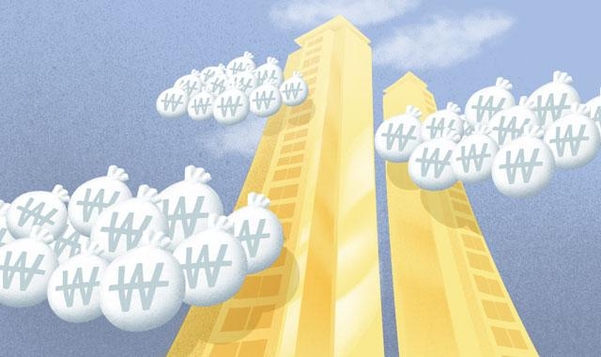Enter 2021.01.14 12:00
It is the largest in the history of occasional deposit and withdrawal, but the term deposit is’minus’
Household loans from domestic banks last year exceeded 100 trillion won. It is the largest ever. When the liquidity to respond to the novel coronavirus infection (Corona 19) was released, money was rushing to real estate and stocks, and the so-called’debt struggle’ fever broke out to invest in loans.
The government’s policy side effects also had a significant impact on the loan market. Loans to leased households rose sharply immediately after the enforcement of the Lease 2 Act, and credit loans rose sharply immediately after regulation. As a result, the number of deposits by deposit and withdrawal, where loans are deposited, recorded a year-round high, and term deposits turned to negative.

The rise in household debt last year is deeply related to the rise in real estate and stock prices. The BOK cited the fact that last year’s home sales transactions increased significantly, and the demand for funds to subscribe to public offerings or purchase stocks was triggered as the biggest cause of the increase in household debt. The demand for living funds has also been partially reflected since Corona 19.
Since the outbreak of Corona 19 last year, the liquidity that has increased has been shifted to real estate and stocks, and demand to jump on the rise in asset prices has sharply increased. According to the Korea Real Estate Agency, the nationwide general housing sale price rose 5.36% per year last year, recording the highest increase in nine years since 2011 (6.14%). The apartment jumped 7.57%.
The share price increase rate was also record. KOSPI rose 30.75% last year and KOSDAQ rose 44.57% last year, and individual investors net bought 46.500 trillion won a year from KOSPI alone.

Credit loans increased by 32.4 trillion won per year, the highest ever. In November, after the implementation of the credit loan management plan was announced, there was also an increase of 7.4 trillion won in one month.
Last year, corporate loans also increased by 107.4 trillion won. Together with household loans, it exceeded 100 trillion won. 87.900 trillion won was concentrated in SMEs where Corona 19 policy support was concentrated, of which 47.500 trillion won went to private businesses. The loan to large corporations was 1.95 trillion won.
With such a rapid increase in annual loans, deposits with temporary deposits increased by 189 trillion won, the largest ever last year. Various loan funds were deposited, and the government’s fiscal execution funds were also largely affected by deposits in the occasional deposit and withdrawal account. On the other hand, the term deposit decreased by KRW 1.4 trillion. It was converted to a decrease from 2019 (48.3 trillion won). It is interpreted that the demand for term deposits has dropped sharply as deposit rates have shown ultra-low interest rates due to a cut in the base rate.
